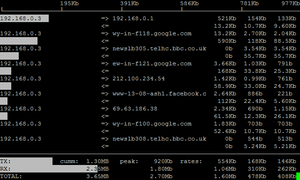iftop
iftop is a free software command-line system monitor tool that produces a frequently updated list of network connections.[2] By default, the connections are ordered by bandwidth usage, with only the "top" bandwidth consumers shown.
 | |
| Developer(s) | Paul Warren |
|---|---|
| Initial release | March 2, 2002[1] |
| Stable release | 0.17
|
| Repository | https://code.blinkace.com/pdw/iftop |
| Written in | C |
| Operating system | Unix-like |
| Type | Bandwidth usage / System monitor |
| License | GNU General Public License |
| Website | www |
The iftop website gives the following description: "iftop does for network usage what top(1) does for CPU usage. It listens to network traffic on a named interface and displays a table of current bandwidth usage by pairs of hosts. Handy for answering the question 'why is our ADSL link so slow?'".
Description
iftop monitors network traffic and displays a table of current bandwidth usage. An interface may be specified or, if not, it will listen on the first interface it finds which looks like an external interface (with libpcap and libncurses). iftop must be run with sufficient permissions to monitor all network traffic; on most systems this means that it must be run as a root user, see sudo.[3]
By default, iftop will look up hostnames associated with addresses and counts all IP packets that pass through the filter. Hostname look-up can add substantial traffic, in and of itself, and may result in an inaccurate display of network traffic. You may wish to suppress display of DNS traffic by using filter code such as "not port domain", or switch it off entirely, by using the -n option or by pressing "n" when the program is running. Using the -F option makes it possible to show packets entering and leaving a given network.
See also
- top (Unix) – the similar top command
- netsniff-ng's ifpps top-like statistics tool
- ntop
- MTR (software)
- List of Unix commands
References
- https://code.blinkace.com/pdw/iftop/raw/master/ChangeLog
- http://static.usenix.org/event/lisa08/tech/full_papers/theocharides/theocharides_html/
- Lakshmipriya (January 2016). "A Novel Approach for Performance and Security Enhancement during Live Migration". Indian Journal of Science and Technology. doi:10.17485/ijst/2016/v9i4/87031.